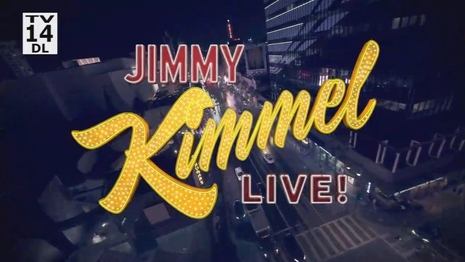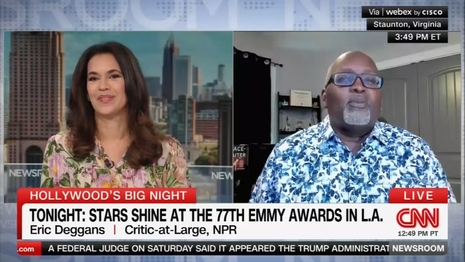 NPR critic-at-large Eric Deggans wrote a 2,400-word piece praising the present posse of liberally-minded late-night comics: “Media companies thought late night TV was irrelevant. Kimmel proved them wrong.”
NPR critic-at-large Eric Deggans wrote a 2,400-word piece praising the present posse of liberally-minded late-night comics: “Media companies thought late night TV was irrelevant. Kimmel proved them wrong.”
Amid the valorization was a strained attempt to make societally relevant the uniformly liberal patter of the hosts, especially new liberal martyr Jimmy Kimmel of ABC, briefly suspended for offensive and false comments about the assassination of conservative activist Charlie Kirk of Turning Point USA.
I saw bold proof that, despite all the talk about late-night TV losing its relevance, there sure seemed to be a lot of people who still cared about what hosts like Kimmel had to say.
Saving the jobs of rich and privileged talk show hosts is a people's movement, apparently.
From the moment when Kimmel visited Stephen Colbert's Late Show to tell him he thought "I'm never coming back on air" after ABC's parent company Disney sidelined him to Kimmel, Colbert and Seth Meyers trolling President Trump with a photo at Jimmy Kimmel Live!, there seemed to be an energized spirit in these hosts joining forces to remind fans why the genre is so special.
Honchos at Disney learned this surprising truth the hard way after they moved to suspend Kimmel last month for sardonic comments he made about supporters of Trump's MAGA movement trying to capitalize politically on the assassination of conservative activist Charlie Kirk.
Less like "sardonic comments" and more like "lying to your audience" that Kirk had been killed by a MAGA movement member.
Given that the suspension decision came after the head of the Federal Communications Commission threatened Disney, ABC and its affiliates, it sure looked like Kimmel was about to join CBS host Stephen Colbert as another Trump critic on late-night TV who would soon lose his job.
And then something amazing happened. People pushed back.
The NPR critic cited an ACLU petition signed by actors and subscriber cancellations of Disney-owned streaming services which supposedly led to Kimmel’s triumphant return.
 Deggans admitted that podcasts and social media have cut into the late-night product and sketched out some possible futures for the genre, tracing its lineage from Steve Allen to Johnny Carson to David Letterman, including the subhead “Today's version: The rise of the political crusaders.”
Deggans admitted that podcasts and social media have cut into the late-night product and sketched out some possible futures for the genre, tracing its lineage from Steve Allen to Johnny Carson to David Letterman, including the subhead “Today's version: The rise of the political crusaders.”
NPR downplayed the knee-jerk liberalism of the new brand of hosts (Stephen Colbert, Samantha Bee, John Oliver, et al).
….Stewart highlighted what he saw as the shortcomings of traditional journalism, the toxicity of media outlets like CNN and the pandering of conservative platforms like the Fox News Channel — teaching audiences to decode this new type of messaging.
At least Greg Gutfeld at Fox News got a mention, with his show Gutfeld! described as "an effort to create a conservative-oriented version of late-night broadcast shows on traditional TV."
Deggans was gently critical of the bland uniformity of political so-called humor on late-night television, only to instantly neutralize his point. It wasn't effective, until Kimmel was "muzzled."
Politics have only gotten more partisan. So Stewart's approach has spread across late-night TV, led by Colbert's version of The Late Show on CBS, John Oliver's Last Week Tonight, Bill Maher's Real Time on HBO and Kimmel himself. In particular, hosts like Colbert, Kimmel and Seth Meyers have become passionate critics of Trump's policies, including his aggressive use of tariffs, his Kennedy Center takeover and his ties to Jeffrey Epstein — but that approach could also sometimes feel predictable and ineffective.
Until the attempt to muzzle Kimmel failed, giving satirists a new cause and fresh passion to pursue it.
Deggans raised the stakes.
The allegiance last week among Kimmel, Colbert, Meyers and other late-night hosts — including Daily Show host Stewart, who crashed one of Kimmel's monologues — proved that these hosts and their insistence on speaking truth to power will likely only survive if they stick together.
Deggans has used that eye-rolling "speaking truth to power" phrase in interviews before in reference to Kimmel. He has previously gone after “copaganda” television and Elon Musk’s ownership of X, while praising then-CNN media reporter Brian Stelter and gushed over “everything is racist” former woke superstar author Ibram X. Kendi.




